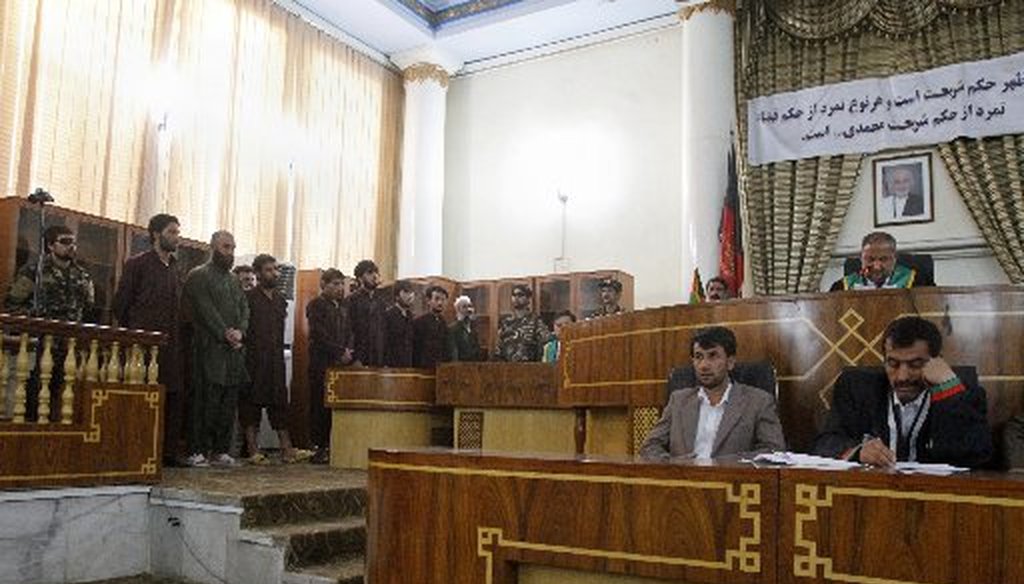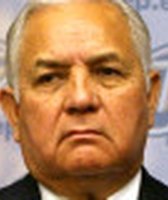Stand up for the facts!
Our only agenda is to publish the truth so you can be an informed participant in democracy.
We need your help.
I would like to contribute

This is a court in Afghanistan that follows Sharia law. We found no evidence Muslims tried to open a Sharia court in Irving, Texas (Photo, The Associated Press).
Muslims tried to open a Sharia court in Irving, Texas, a chain email says.
Really?
After a Houston reader forwarded the chain email to us, we hunted for confirmation.
News stories and a commentary by Bud Kennedy of the Fort Worth Star-Telegram indicated something afoot, though no court.
The reader forwarded us the chain email, which said: "The group of Muslims who attempted to establish the first Islamic Sharia court inside the United States in the town of Irving, Texas just received a devastating blow thanks to the town’s mayor standing strong and not backing down." The mayor, Beth Van Duyne, this year led the Irving City Council to pass a resolution endorsing an ultimately unsuccessful Texas House proposal. House Bill 562, which cleared a House committee but didn’t make it to a floor vote, barred foreign courts or laws from superseding U.S. laws.
The chain email further said efforts by Van Duyne "to stop this abomination will echo throughout the country, setting precedent for other cities and towns where Muslims attempt to establish footholds. Share this if you support the mayor’s efforts to put a screeching halt to the formation of illegal Sharia courts in her Texas town."
Chatter about such a court may have been touched off by a Feb. 2, 2015, news report by CBS 11 News headlined: "North Texas Home to First Islamic Tribunal in U.S." The station’s story, reported from Irving, said four local religious judges, guided by Sharia law, "are offering up their services to handle cases involving divorce, business problems and other disputes among the community" though not other civil or criminal matters nor child support, custody battles or asset transfers, the story said. Also, the story said, its rulings are nonbinding. Moujahed Bakhach, described as one of the tribunal judges, said generally that state and federal laws would always take precedent.
In his Feb. 19, 2015, commentary, Kennedy did not repeat the first-in-the-land characterization. After describing local objections to a "dispute panel" offered at an Irving mosque as "Shariah-phobia," Kennedy said: "Imam Moujahed Bakhach of Fort Worth, two other area imams and a case manager from a Dallas law firm hear disputes for a $1,200 fee.
We called the organizers of IslamicTribunal.org and didn't hear back. But a Georgia lawyer who has studied such mediation projects advised it's not a court.
Lee Ann Bambach, who wrote a dissertation titled "Faith-Based Arbitration by Muslims in an American Context," told us by phone she considers the Dallas-rooted Islamic Tribunal an alternative dispute resolution service--not a court working outside the bounds of U.S. law. "They’re not trying to establish anything that’s going to take jurisdiction away from the state or federal courts," Bambach said. Similarly, she said, Christians and orthodox Jews sometimes adopt dispute resolution processes. Broadly, Bambach said, there is nothing in the U.S. she’d call a Sharia court. "I’d call them dispute resolution services," she said.
Not many services like the Islamic Tribunal otherwise exist in the U.S., Bambach said by email, with most alternative dispute resolution done informally in mosque settings. "I am aware of no such tribunals/services that seek to enforce any aspect of sharia criminal law," Bambach said.



































